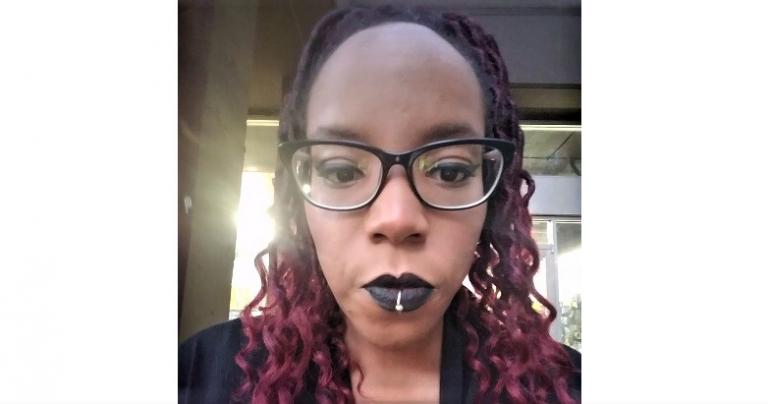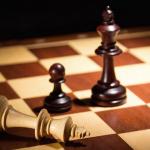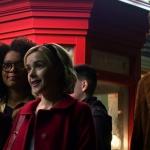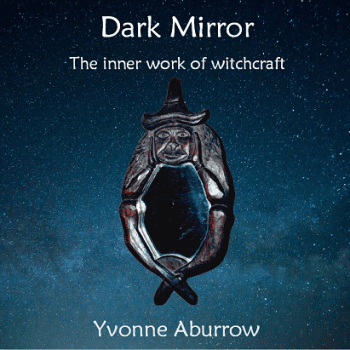Hello, beautiful creatures! Today, I have the unalloyed pleasure of sharing with you an interview I conducted with Shannon Barber, a Black Queer writer and witch based in Seattle. Barber has written and published for over two decades, in genres ranging from poetry and essays on social justice to horror and urban fantasy fiction. I’ve lauded Barber’s work before on this very blog, and I was delighted when they agreed to my request for an interview. Enjoy!

The super-fast version is that, I needed and wanted a connection to the sacred that I felt in my bones. I’ve experienced a lot of other religious practices and the witchery fit. That said, I have a really deep love and respect for other religions. I love them the same way I love art, I love when folks want to share their divine with me. In the series, I really want to give the more detailed and non-esoteric version of how I have touched and rolled around in my magic.
What does your practice nowadays look like?
My partner and I moved this year so my practice has been a little scattershot. I have been doing small intuitive rituals a lot. I incorporate my rituals into my self-care. I do a lot of intentional cleansing showers, I use scents and even when I’m doing a cleansing on myself, I like to go from dry brushing my body, deep exfoliation, clarifying my hair, doing a face treatment. I take time to notice small things in nature and let my divine things speak to me that way. It sounds fancier than it really is. The best way to do magic for me is really just doing what my spirit says to, using intentions or prayers, talking to my particular pantheon or feeling like they are yelling at me. I do daily divinations for myself with a tarot app on my phone. I wouldn’t call myself a reader but it really helps me focus and sometimes listen to deeper things.
If I can flex my vocabulary a little bit. I practice a lot of intuitive zoomancy, I find that bibliomancy and stichomancy play a fairly large part of my divination. I will pick up any book and look in or at it, often I’ll find things that go with or are related to my troubles or things on my mind. It is pretty ding dang great.
In what ways do gender, sexuality, and queerness in general inform or influence your practice?
I had to really think about this. I feel like a lot of my magical practice is the place where I can not necessarily engage with gender, sexuality and my queerness so much. I have been out and proud queer for a very long time however, having a space to just be without having to talk about it is pretty important to me. I can exist in my magical spaces without having to explain that I do in fact exist. Me existing inside of my practice is easy in a way that it isn’t in the rest of the world.
What could the broader woo community do to make itself more welcoming of queer folks, and why do you think that’s not happening?
I think like most communities I’m in, once folks realize that lip service isn’t enough they can tend to wilt a bit. It is like doing spellwork or setting intentions but not putting the will behind it. It takes work and a lot of that works means having to be uncomfortable and a lot of people won’t tolerate discomfort. And the thing is, change is painful. When the seasons change, our bodies hurt, our emotions can be all over the place and I fully believe that doing the real work of inclusion hurts the same way.
You’ve been really upfront about the ways in which race has influenced your path. Can you talk a little about that here?
The most basic thing about is that old meme that says something like, what has been seen cannot be unseen. I think once my ability to connect my Blackness through more of my life including my magical practices, I couldn’t not see where my Blackness was subtly or upfront rejected. Being in Seattle I experienced a lot of the liberal I DON’T EVEN SEE RACE and having to navigate that in so much of my life, at one point I just decided not to do it in my spiritual practices. As I get older, I just refuse to even give lip service to the idea of my Blackness not being as inherent to me living as my blood.
When it comes to things like pagan witchcraft, a lot of my issues came from not having what felt like a real connection and the hypocrisy I saw in the community. I think this was a large part of my budding SJW Necromancer skills. I saw harm done, in ways that were things like liberal racism or anti-Blackness that went completely unacknowledged while things like, my habit of laying casual curses was a problem. The classic Wiccan Rede left me cold. I enjoy the lore but I have zero spiritual connection to it. And I want to be clear, I’m not talking a blood connection necessarily, I had no soul connection to it and that path became lost to me.
Where do you see the modern witchy, Pagan, polytheist, and occult communities failing where issues of race and queerness are concerned?
I see a lot of get off my lawn-ness and judgement about how folks are outwardly (Instawitches etc.) doing their stuff. I see a lot of the same type of pushback I saw when I was a kid. The idea that how we disseminate information or share our practices must always be esoteric and hard is a long-standing thing that just kind of makes me laugh. I remember when I was looking into Thelema and things like chaos magic and vampirism, there was this whole aura of you had to know somebody and seem cool enough or whatever to be gifted with the information. I see a lot of the same behavior now and it just silly to me.
I am DEEP in love with the way that I see other magical folks doing things like YouTube channels, blogs and whatever social media. I don’t think that folks need to pass some magical purity test to prove to anyone that they want the knowledge. I have seen a lot of White discomfort about what seems on the surface like an invasion (a phrase I heard from a White person witch) of us mysterious others and it just makes me tired. I see it manifested in folks upset that race is brought up in the context of magical discussions. In how folks buck against being taught about appropriation and why it is harmful. The worst thing to me, is that the conversations are the same as they were 20 years ago.
There is so little reason to continue othering anyone outside of the default Whiteness. Can we just stop doing that?
What changes do you most want to see in our communities?
I want justice. I want more of us to stop relying on rainbows and puppy tails and get to work. We have shit to dismantle and if we can’t use our strengths and just, damn it. We have to stop pretending like our communities are above the grossest –isms in the world. We can’t claim some super special sacredness if we keep replicating the big badness in the rest of the world.
Are there any particular books or practices you’d recommend for a baby witch just starting out? Or is it more of an attitude and an approach?
I poke fun at them, but the beginner Llewellyn books are absolutely classics for a reason. African American Folk Healing by Stephanie Mitchem, Culpeper’s Complete Herbal: Over 400 Herbs and Their Uses by Nicholas Culpeper, The Satanic Bible by Anton Szandor LaVey, The Handbook of Yoruba Religious Concepts by Baba Ifa Karade, the Qu’ran, the Bible, Sufi poetry, the transcripts of the Salem witch trials. I highly recommend reading outside of your personal practices to see into the worlds of others. Also read widely and promiscuously.
You’re a poet, a fiction writer, and an essayist. How do those worlds intersect with your magical and devotional praxis?
I will be talking more about this in my aforementioned series, but really creative things—making—is in the upper echelon of holiness to me. For me, a huge part of my practice and belief system means that I want to touch the divine and in a lot of ways my creative work is my method to do that. I went through a time when I forced myself to try and believe that this need in me was just some snowflakey nonsense, and I’ve come to believe that, even if it is, I’m not mad about it. If this is what I need to connect to that part of who I am, let’s go.
Where would you recommend someone get started reading your work? Your poetry, your Daiyuverse fiction, your essays?
This is probably to my own detriment but I’d say my essays. I have a large back catalog of fiction and poetry, but at this point I think folks should read the hard stuff first. I think sometimes because I do different things, folks come to my work with certain expectations and they are often disappointed.
Where can we learn more about what you do?
Gosh, I’m all over the place. Lately the best place is my website (please pardon the ugly, I’m in the middle of a redesign I insist on doing by myself because I’m terrible), where there are links to my writing related blog, my Patreon, and other stuff there. Fair warning, my social media tends to be all over the place.
Many thanks to Shannon for agreeing to this interview, and for being super-easy to work with. Until next time, dear ones. ♥













